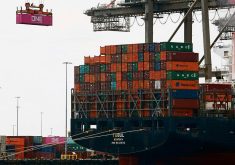Ottawa | Reuters — Canada’s top court on Thursday ruled against a New Brunswick man who had argued he had the constitutional right to buy beer more cheaply in a neighbouring province, saying that the law does not impose absolute free trade across the country.
Dubbed the “free the beer” case in Canadian media, it centered around whether New Brunswick’s prohibition on bringing in large amounts of alcohol from another province was effectively a tariff.
The question of provincial rights has come into focus recently with British Columbia’s opposition to Kinder Morgan’s Trans Mountain pipeline, which has been approved by the federal government.
Read Also

U.S. grains: Chicago corn, soy prices recover on updated biofuel guidance
Chicago | Reuters – Chicago grain and soybean futures regained ground on Tuesday as a selloff in commodity markets subsided…
In the beer case, in 2012 Gerard Comeau was stopped by the police and fined $240 plus fees for bringing alcohol from Quebec to New Brunswick where he lived. Police seized 354 bottles or cans of beer and three bottles of liquor that Comeau had purchased.
The sale and distribution of alcohol in Canada is controlled by the country’s 10 provinces and three territories. The provinces also tightly regulate other sectors, particularly agricultural industries, to protect their local economies.
The court found a broad interpretation of the constitution as argued by Comeau would have broad implications for provinces’ agricultural supply management systems, environmental controls and other regulatory measures and could render them invalid.
The constitution “does not impose absolute free trade across Canada,” the court wrote in a unanimous ruling.
While it stops governments from imposing tariffs, it “does not prohibit governments from adopting laws and regulatory schemes directed to other goals that have incidental effects on the passage of goods across provincial borders.”
The court found that the main purpose of New Brunswick’s law was to manage the supply of alcohol in the province, not to restrict interprovincial trade, and was therefore constitutional.
The court did not rule on the question of whether the section of the constitution applies equally to federal and provincial laws, saying there was no federal law at issue in this case.
Following Thursday’s ruling, southwestern Ontario MP John Nater, the federal Conservatives’ shadow cabinet secretary for interprovincial trade, called on the government to renegotiate the current Canadian Free Trade Agreement.
That agreement today “contains pages of exemptions and creates secretive working groups, but fails to adequately address interprovincial trade barriers,” he said. “It should not be illegal to work or to transport legal products across provincial lines.”
The opposition Tories had previously made the Comeau case a federal campaign issue under the “Free The Beer” slogan, contending that “right now it is easier for a winery in B.C. to directly sell into Asia than it is to sell in Ontario.”
“It is now up to the provinces to use the channels they developed, such as the alcoholic beverages working group” set up as part of the trade agreement, to find ways to lower such barriers, Corinne Pohlmann, a senior vice-president with the Canadian Federation of Independent Business, said Thursday in a separate release.
— Reporting for Reuters by Leah Schnurr. Includes files from AGCanada.com Network staff.















